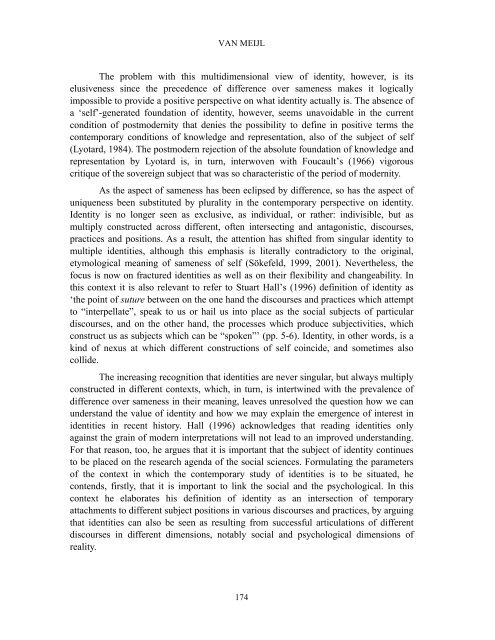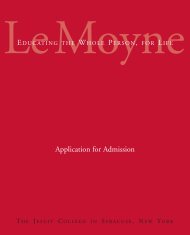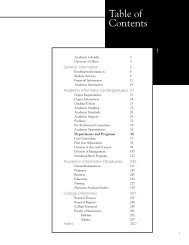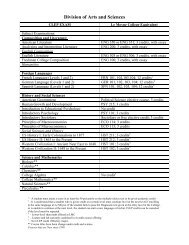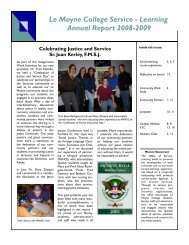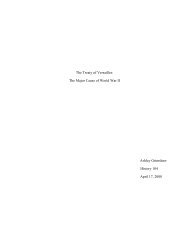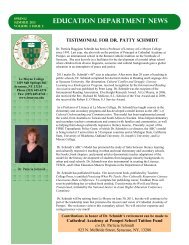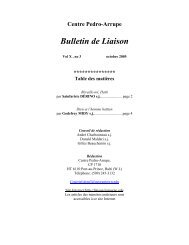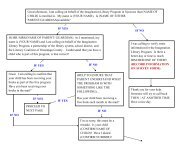165 culture and identity in anthropology: reflections on 'unity'
165 culture and identity in anthropology: reflections on 'unity'
165 culture and identity in anthropology: reflections on 'unity'
Create successful ePaper yourself
Turn your PDF publications into a flip-book with our unique Google optimized e-Paper software.
VAN MEIJLThe problem with this multidimensi<strong>on</strong>al view of <str<strong>on</strong>g>identity</str<strong>on</strong>g>, however, is itselusiveness s<str<strong>on</strong>g>in</str<strong>on</strong>g>ce the precedence of difference over sameness makes it logicallyimpossible to provide a positive perspective <strong>on</strong> what <str<strong>on</strong>g>identity</str<strong>on</strong>g> actually is. The absence ofa ‘self’-generated foundati<strong>on</strong> of <str<strong>on</strong>g>identity</str<strong>on</strong>g>, however, seems unavoidable <str<strong>on</strong>g>in</str<strong>on</strong>g> the currentc<strong>on</strong>diti<strong>on</strong> of postmodernity that denies the possibility to def<str<strong>on</strong>g>in</str<strong>on</strong>g>e <str<strong>on</strong>g>in</str<strong>on</strong>g> positive terms thec<strong>on</strong>temporary c<strong>on</strong>diti<strong>on</strong>s of knowledge <str<strong>on</strong>g>and</str<strong>on</strong>g> representati<strong>on</strong>, also of the subject of self(Lyotard, 1984). The postmodern rejecti<strong>on</strong> of the absolute foundati<strong>on</strong> of knowledge <str<strong>on</strong>g>and</str<strong>on</strong>g>representati<strong>on</strong> by Lyotard is, <str<strong>on</strong>g>in</str<strong>on</strong>g> turn, <str<strong>on</strong>g>in</str<strong>on</strong>g>terwoven with Foucault’s (1966) vigorouscritique of the sovereign subject that was so characteristic of the period of modernity.As the aspect of sameness has been eclipsed by difference, so has the aspect ofuniqueness been substituted by plurality <str<strong>on</strong>g>in</str<strong>on</strong>g> the c<strong>on</strong>temporary perspective <strong>on</strong> <str<strong>on</strong>g>identity</str<strong>on</strong>g>.Identity is no l<strong>on</strong>ger seen as exclusive, as <str<strong>on</strong>g>in</str<strong>on</strong>g>dividual, or rather: <str<strong>on</strong>g>in</str<strong>on</strong>g>divisible, but asmultiply c<strong>on</strong>structed across different, often <str<strong>on</strong>g>in</str<strong>on</strong>g>tersect<str<strong>on</strong>g>in</str<strong>on</strong>g>g <str<strong>on</strong>g>and</str<strong>on</strong>g> antag<strong>on</strong>istic, discourses,practices <str<strong>on</strong>g>and</str<strong>on</strong>g> positi<strong>on</strong>s. As a result, the attenti<strong>on</strong> has shifted from s<str<strong>on</strong>g>in</str<strong>on</strong>g>gular <str<strong>on</strong>g>identity</str<strong>on</strong>g> tomultiple identities, although this emphasis is literally c<strong>on</strong>tradictory to the orig<str<strong>on</strong>g>in</str<strong>on</strong>g>al,etymological mean<str<strong>on</strong>g>in</str<strong>on</strong>g>g of sameness of self (Sökefeld, 1999, 2001). Nevertheless, thefocus is now <strong>on</strong> fractured identities as well as <strong>on</strong> their flexibility <str<strong>on</strong>g>and</str<strong>on</strong>g> changeability. Inthis c<strong>on</strong>text it is also relevant to refer to Stuart Hall’s (1996) def<str<strong>on</strong>g>in</str<strong>on</strong>g>iti<strong>on</strong> of <str<strong>on</strong>g>identity</str<strong>on</strong>g> as‘the po<str<strong>on</strong>g>in</str<strong>on</strong>g>t of suture between <strong>on</strong> the <strong>on</strong>e h<str<strong>on</strong>g>and</str<strong>on</strong>g> the discourses <str<strong>on</strong>g>and</str<strong>on</strong>g> practices which attemptto “<str<strong>on</strong>g>in</str<strong>on</strong>g>terpellate”, speak to us or hail us <str<strong>on</strong>g>in</str<strong>on</strong>g>to place as the social subjects of particulardiscourses, <str<strong>on</strong>g>and</str<strong>on</strong>g> <strong>on</strong> the other h<str<strong>on</strong>g>and</str<strong>on</strong>g>, the processes which produce subjectivities, whichc<strong>on</strong>struct us as subjects which can be “spoken”’ (pp. 5-6). Identity, <str<strong>on</strong>g>in</str<strong>on</strong>g> other words, is ak<str<strong>on</strong>g>in</str<strong>on</strong>g>d of nexus at which different c<strong>on</strong>structi<strong>on</strong>s of self co<str<strong>on</strong>g>in</str<strong>on</strong>g>cide, <str<strong>on</strong>g>and</str<strong>on</strong>g> sometimes alsocollide.The <str<strong>on</strong>g>in</str<strong>on</strong>g>creas<str<strong>on</strong>g>in</str<strong>on</strong>g>g recogniti<strong>on</strong> that identities are never s<str<strong>on</strong>g>in</str<strong>on</strong>g>gular, but always multiplyc<strong>on</strong>structed <str<strong>on</strong>g>in</str<strong>on</strong>g> different c<strong>on</strong>texts, which, <str<strong>on</strong>g>in</str<strong>on</strong>g> turn, is <str<strong>on</strong>g>in</str<strong>on</strong>g>tertw<str<strong>on</strong>g>in</str<strong>on</strong>g>ed with the prevalence ofdifference over sameness <str<strong>on</strong>g>in</str<strong>on</strong>g> their mean<str<strong>on</strong>g>in</str<strong>on</strong>g>g, leaves unresolved the questi<strong>on</strong> how we canunderst<str<strong>on</strong>g>and</str<strong>on</strong>g> the value of <str<strong>on</strong>g>identity</str<strong>on</strong>g> <str<strong>on</strong>g>and</str<strong>on</strong>g> how we may expla<str<strong>on</strong>g>in</str<strong>on</strong>g> the emergence of <str<strong>on</strong>g>in</str<strong>on</strong>g>terest <str<strong>on</strong>g>in</str<strong>on</strong>g>identities <str<strong>on</strong>g>in</str<strong>on</strong>g> recent history. Hall (1996) acknowledges that read<str<strong>on</strong>g>in</str<strong>on</strong>g>g identities <strong>on</strong>lyaga<str<strong>on</strong>g>in</str<strong>on</strong>g>st the gra<str<strong>on</strong>g>in</str<strong>on</strong>g> of modern <str<strong>on</strong>g>in</str<strong>on</strong>g>terpretati<strong>on</strong>s will not lead to an improved underst<str<strong>on</strong>g>and</str<strong>on</strong>g><str<strong>on</strong>g>in</str<strong>on</strong>g>g.For that reas<strong>on</strong>, too, he argues that it is important that the subject of <str<strong>on</strong>g>identity</str<strong>on</strong>g> c<strong>on</strong>t<str<strong>on</strong>g>in</str<strong>on</strong>g>uesto be placed <strong>on</strong> the research agenda of the social sciences. Formulat<str<strong>on</strong>g>in</str<strong>on</strong>g>g the parametersof the c<strong>on</strong>text <str<strong>on</strong>g>in</str<strong>on</strong>g> which the c<strong>on</strong>temporary study of identities is to be situated, hec<strong>on</strong>tends, firstly, that it is important to l<str<strong>on</strong>g>in</str<strong>on</strong>g>k the social <str<strong>on</strong>g>and</str<strong>on</strong>g> the psychological. In thisc<strong>on</strong>text he elaborates his def<str<strong>on</strong>g>in</str<strong>on</strong>g>iti<strong>on</strong> of <str<strong>on</strong>g>identity</str<strong>on</strong>g> as an <str<strong>on</strong>g>in</str<strong>on</strong>g>tersecti<strong>on</strong> of temporaryattachments to different subject positi<strong>on</strong>s <str<strong>on</strong>g>in</str<strong>on</strong>g> various discourses <str<strong>on</strong>g>and</str<strong>on</strong>g> practices, by argu<str<strong>on</strong>g>in</str<strong>on</strong>g>gthat identities can also be seen as result<str<strong>on</strong>g>in</str<strong>on</strong>g>g from successful articulati<strong>on</strong>s of differentdiscourses <str<strong>on</strong>g>in</str<strong>on</strong>g> different dimensi<strong>on</strong>s, notably social <str<strong>on</strong>g>and</str<strong>on</strong>g> psychological dimensi<strong>on</strong>s ofreality.174


